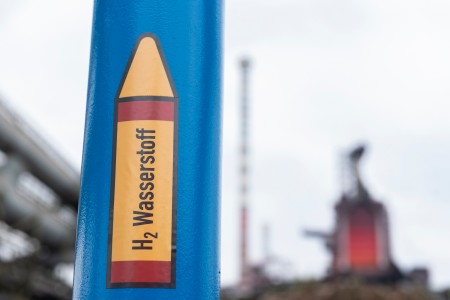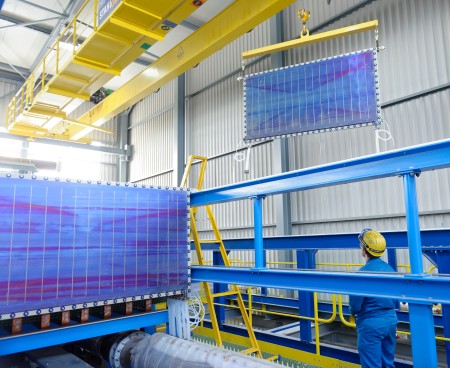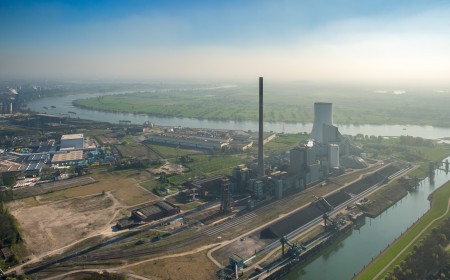Daily press, 2020-12-03, 01:00 pm
Green hydrogen for green steel made in Duisburg: STEAG and thyssenkrupp are planning joint hydrogen project
- Joint feasibility study to be the basis for project development and hydrogen hub
- Water electrolysis on STEAG site in Duisburg-Walsum, based on electrolysis technology from thyssenkrupp
- Electrolysis capacity of up to 500 MW
- Supply of hydrogen and oxygen for thyssenkrupp steel mill in Duisburg
- Project offers interested investors participation in hydrogen economy
Essen-based energy company STEAG, Duisburg-based steel producer thyssenkrupp Steel and Dortmund-based thyssenkrupp Uhde Chlorine Engineers, specializing in electrolysis technology, are working on a joint feasibility study. The study deals with the construction of a water electrolysis plant at the STEAG site in Duisburg-Walsum by thyssenkrupp Uhde Chlorine Engineers, the structuring of energy supply and operation of the electrolysis plant by STEAG and the supply of green hydrogen and oxygen to thyssenkrupp Steel's steel mill in the neighboring Duisburg district of Bruckhausen. The study will lay the basis for the subsequent project development. All three parties involved are planning to participate as investors and will actively seek private and public funding.
Establishment of a hydrogen hub in North Rhine-Westphalia
The hydrogen strategies recently adopted by the state of North Rhine-Westphalia as well as those of the German Federal Government and the European Union underline the importance of hydrogen for a climate-neutral society. They endorse the development of a hydrogen economy and infrastructure in Germany and in Europe. In this context, the state of North Rhine-Westphalia and the city of Duisburg can play a key role: This region is the center of hydrogen demand and technological expertise for the construction and operation of electrolysis plants. The hydrogen roadmap of the state of North Rhine-Westphalia illustrates this fact, and the collaboration of three companies based in this region aimed at establishing a local hydrogen production hub underlines this perspective
Continuously increasing hydrogen demand in steel production
In the coming years, thyssenkrupp Steel’s climate strategy will entail a continuously increasing and constant demand for green hydrogen. In a first step, this hydrogen is to substitute part of the carbon in the existing blast furnaces, later on it is to be used in new direct reduction plants. In the next few years, the company expects the conversion of one blast furnace to result in an annual demand of around 20,000 tonnes of green hydrogen. This demand will increase to some 720,000 tonnes per year by 2050 as a result of the gradual conversion of the plants and equipment. With a capacity of up to 500 megawatts (MW), the projected electrolysis plant on the STEAG site could produce as much as about 75,000 tonnes of green hydrogen each year – enough for the first direct reduction plant of the steel producer. It would thus make an important contribution to the short- and long-term supply of the steel mill.
“At its core, our climate transformation is based on the use of hydrogen“, explains Dr. Arnd Köfler, Chief Technology Officer at thyssenkrupp Steel. “It is the key to using the great potential we have in reducing CO2 emissions in the steel industry. It is important to plan ahead. We must set the course for supply today so that we can produce climate-neutral steel tomorrow. In this context, the cooperation between three companies based in the region is an important element. With this project, we will lay the foundation of a hydrogen economy in North Rhine-Westphalia. Moreover, this project offers investors the possibility to directly invest in this growth market.“
STEAG site in Duisburg-Walsum offers numerous advantages
The immediate proximity of the sites allows optimum transport connections to the steelworks: The project includes the construction of two new pipelines to transport hydrogen and oxygen from Walsum to the steel mill less than three kilometers away. The connection to the extra high-voltage grid ensures the supply of green electricity for the electrolysis; large-scale battery systems ensure grid stability. The approximately 15-hectare site in Duisburg-Walsum offers the possibility to erect electrolysis units with a total capacity of up to 500 MW. It also has a connection to the existing natural gas network, which in the future could also be used for the transport of hydrogen.
But not only the physical proximity of the STEAG site is an argument in favor of the Essen-based energy company. With the “HydroHub“ in Völklingen-Fenne, Saarland, a project outline included by the Federal Ministry of Economics in the group of ”Real-World Laboratories of the Energy Revolution“, STEAG has already gained experience in the field of hydrogen economy.
“The joint project of thyssenkrupp and STEAG would send out a strong signal for an important center of the German industry: Construction and operation of an electrolysis plant of this scale would not only safeguard the steel and energy location in Duisburg, but would make the city the center of a thriving green hydrogen economy in one go. This will have an impact beyond Duisburg and the Ruhr region“, says STEAG’s Managing Director Dr. Ralf Schiele. Duisburg would thus become a global beacon project in the field of climate-neutral steel production. At the same time, the project is an important part of STEAG’s strategic reorientation, with the focus on developing the business with energy solutions and on intensifying activities in the field of renewables.
Water electrolysis technology by thyssenkrupp
The water electrolysis will be installed by thyssenkrupp Uhde Chlorine Engineers’ product division Green Hydrogen and consists of pre-fabricated standard modules. This modular system allows to easily scale up a plant to several hundred megawatts or gigawatts. This is why the technology is particularly suitable even beyond green steel production for an industrial-scale decarbonization on the path towards sustainable value chains and CO2 reduction. This kind of sector coupling enables new business models and a sustainable circular economy, which is to be completely powered by renewable energy sources in the future. Together with the Business Unit Chemical and Process Technologies, thyssenkrupp in Dortmund is able to supply the entire range of green chemicals, from hydrogen to ammonia, methanol and synthetic natural gas, thus contributing significantly to a climate-neutral industry.
Being the largest project of its kind, this is a blueprint for exporting know-how and high-tech applications from North Rhine-Westphalia to the world. “We are excited to contribute our 50 years of experience in the planning, construction and operation of electrolysis plants to this project, in order to produce competitive green hydrogen on an industrial scale“, says Sami Pelkonen, CEO of the Business Unit Chemical and Process Technologies. “In this strong partnership, we can bring our cutting-edge technology from the region available for the region.”
Attractive project for investors
The project will be open to investors: Aside from participating in the project development, investors can acquire shares in the new operating company to be founded. In doing so, investors finance – together with the project partners – the development and construction of the water electrolysis plant and the connection to the steel mill, while securing a stable cash flow due to the regular purchase of green hydrogen and oxygen by thyssenkrupp Steel. The geographical proximity to the customer makes the project largely independent of third parties and facilitates its swift realization. Apart from attracting investors, the project partners will also apply for public funding granted within the scope of state aid for climate-neutral technologies.
The project development is planned to start as soon as a positive result of the feasibility study is obtained.
thyssenkrupp Steel Europe is one of the world’s leading suppliers of carbon steel flat products. With around 28,000 employees, the company supplies high-quality steel products for innovative and demanding applications in a wide variety of industries. Customer-specific material solutions and services around steel complete the range of services. With a production volume of approximately 11 million tonnes of crude steel annually, thyssenkrupp Steel is the largest flat steel producer in Germany.
For more than 80 years, STEAG has been synonymous with efficient and safe power generation, both within Germany and abroad. We draw on our extensive experience in technology and energy to support our customers in every aspect of the power generation process. We plan, develop, construct, operate and market high-efficiency energy solutions – from distributed and regenerative generating facilities down to large power plants and storage facilities. Besides custom power and heat generation solutions, we offer a wide range of energy services, increasingly on the basis of renewable energies.
thyssenkrupp Uhde Chlorine Engineers, a joint venture between thyssenkrupp Industrial Solutions AG and Industrie De Nora, is a global leading provider of technologies for highly efficient electrolysis plants. The company has already successfully completed more than 600 projects and electrochemical plants worldwide with a total output of over 10 gigawatts. With its water electrolysis technology for the production of green hydrogen, the associated product division Green Hydrogen offers an innovative solution for industrial-scale applications. Together with thyssenkrupp’s Business Unit Chemical and Process Technologies, thyssenkrupp covers the entire value chain for green chemicals, from hydrogen to ammonia, methanol and synthetic natural gas – a major step towards a climate-neutral industry.






